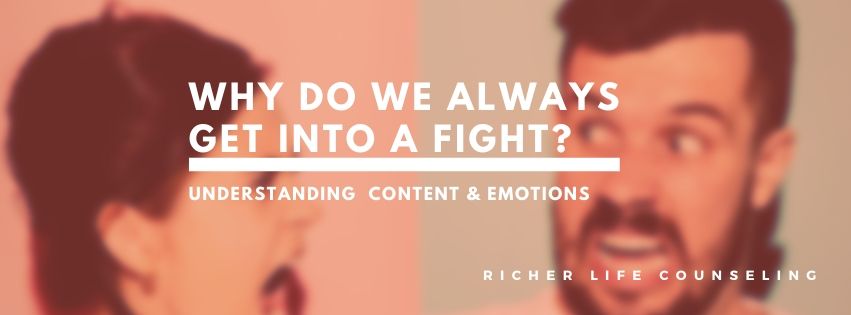It happened again, didn’t it? Does it seem like you get stuck in the same type of fight, argument, or bicker with your partner? Most couples seek out couples counseling because they want to work on how they communicate, yet 99.9% of the time, they have no problem at all communicating with me in the therapy office. Why is that? In my previous post, I shared the story of a fight I had all the time when I was in grad school and what I learned about myself. Make sure you read about primary and secondary emotions to fully understand this post. So here is my answer to “why do we always get into a fight?”
Emotions
Quick review from my post about primary and secondary emotions. Our feelings are super complicated, and we actually feel many things all at once. We generally find it easier to label and express secondary emotions. These emotions are like a protective layer from the softer primary emotions.
Example:
I express anger at you coming home late because the reason I was angry is that I was worried something happened to you.
Anger = Secondary
Worried = Primary
You feel both of those feelings at the same time. The only problem is that secondary emotions generally push people away, and primary emotions tend to be softer and bring people closer. All emotional “stuff” is actually tough to talk about. In our culture, we experience very little emotional development. This is why there are tons of books about developing better emotional IQ. Luckily, emotional language is something that can be learned. I encourage you to find ways to read more blog posts, books, view YouTube videos, and listen to podcasts on how to start gaining an emotional language.
Content
Now that you understand a little bit more about how emotions work, let’s explore what I like to call content. Content is the story, an explanation, the stuff that is actually happening. Content is what we fight about. Here are some examples of how content shows up in the therapy office.
- Explaining the process of the fight “this happened…” “then I said this… then you did this…,” etc.
- When one partner makes a point, then the other partner makes point of changing the subject
- When we tell our partners what to do or say
- Defensiveness
- Any part of the 4 Horsemen
Content is how we explain our feelings, the problem is that most of the time that’s because we don’t know how to label what we are feeling. Thus, we actually don’t share what we are feeling. We keep trying to explain what we are feeling, or we try to get our emotional needs met without knowing what we need.
Communication isn’t the problem.
Most couples who come to couples counseling state that they want to work on communication. Communication is content, the problem isn’t communication. The problem is that we are only communicating the content. When you stop sharing your feelings or are unable to share your feelings in a vulnerable, loving way, you get stuck in a negative cycle.
But I share my emotions.

You might be saying to yourself, but I share my emotions all the time, and my partner doesn’t hear me, and we get into fights. One of the things that I see a lot of the time is one partner (maybe both of you) “share” your emotions but do it in a way that is not vulnerable. A lot of the time, you might be sharing what you are feeling, but if you don’t learn to own and share your feelings in a new, softer way, your emotions get lost.
How can I tell if I am sharing my feelings in a vulnerable way?
To know if you are sharing your emotions and your emotional needs in a vulnerable way, it MUST feel uncomfortable, raw, exposed. Vulnerability by nature is hard. If it is not hard to share, then it is not vulnerable. The practical advice on how to know if you’re vulnerable is if it meets the following criteria.
- Are you sharing in a soft kind of way?
- You don’t have to explain your feelings and needs, or can you just share them?
- Nonvulnerable – I’m feeling overwhelmed because I have to take care of the kids, work, and do all the housework, and it’s like you don’t do anything.
- Vulnerable – I am overwhelmed and I need your help watching the kids.
- Deeper vulnerability is usually short and sweet – you don’t need a lot of explaining (aka content) to share what you are feeling and what you need.
Emotions Before Content
Don’t get me wrong, content is essential. It gives context and explanation of what is going on. In my post on what fighting about the dishes taught me, I had to share the content of what all was making me feel overwhelmed. BUT I shared that I was overwhelmed at first in a soft, loving vulnerable way then to help my partner understand, I gave the context in which my feelings of being overwhelmed existed.

80/20 Rule
Most of the time, we spend 80% of our time content and 20% on our emotions. This is what leads to communication problems. You both are trying to get emotional needs met but are getting lost in the content because there is too much of it. Something that I tell my clients all the time is that the content of what they fought about is much less relevant than what was driving the fight i.e., the emotions. One of the keys is to switch how we connect. We put our emotions first, then the content. Spend 80% of the time in sharing vulnerable emotions in loving ways and only spend 20% of your time in the content of why you feel the way you feel. Now, if you both can start to share your emotions, you will need to learn to show up for each other. This is called empathy, and luckily it is a skill that you can learn. You can learn about how to build empathy by checking out our blog post on the topic.
Improve Emotional Sharing
Now if you are thinking to yourself, “this makes sense, but I don’t think I can get my partner to lovingly share their emotions” or you might be thinking “I don’t know if I can share my feelings with my partner” then finding a skilled therapist who has training in emotionally focused couples counseling can be helpful. If you would like to book with us, you can contact us below. You can also check out our other blog about relationships that can help you emotionally connect in new ways.
At Richer Life Counseling we specialize in working with all types of counseling, and all types of relationship problems. Check out our articles on relationships here.
Contact us today by calling or texting 702-518-1546, email, or booking a session by hitting the appointment request button. We can normally get you into a session within 24 or 48 hours.
We offer both online therapy (learn more about online therapy here) and in-person therapy at our Las Vegas office. Our office is located in West Las Vegas right off the 95 & Rainbow. Our address is 222 S. Rainbow Boulevard | Suites 113-114 |Las Vegas NV 89145
- Table Topics - June 25, 2020
- How to Apologize - June 11, 2020
- What is stonewalling? |TheRicher Marriage Show - June 5, 2020

